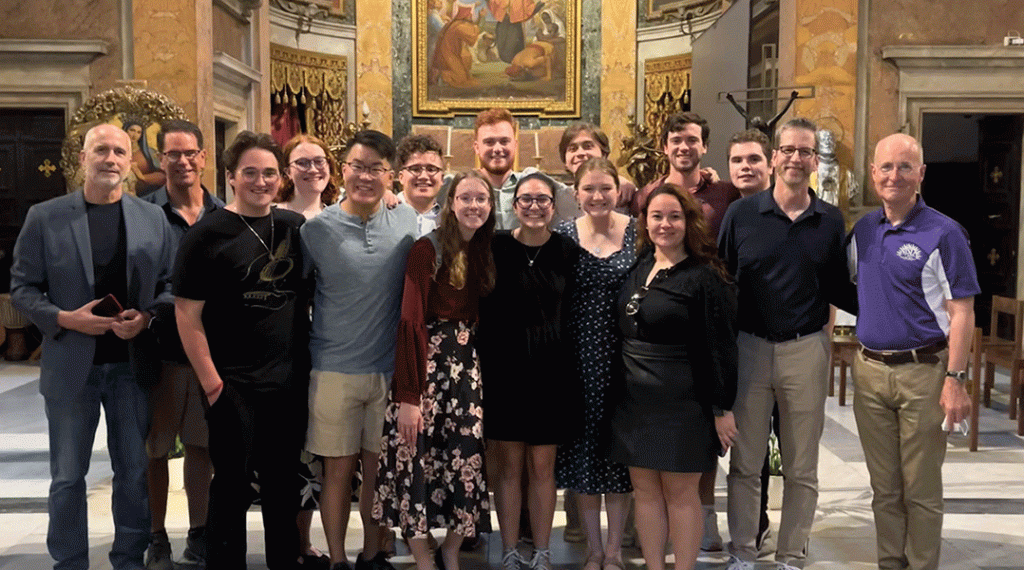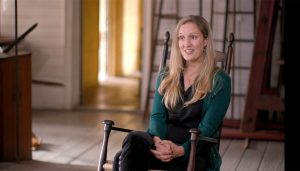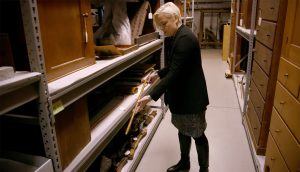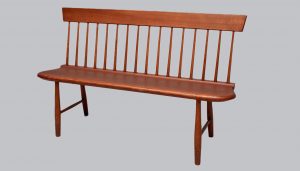]]>“It’s a great improvement from the time when the pope was just a king in his throne surrounded by a royal court,” he said. “But with such expectations can any pope govern into his 80s and even 90s and be effective?”
“The effort to change the rigidly top-down nature of governance in Catholicism is the main reform project of the Francis papacy and its success or failure will likely be his chief legacy,” said Fordham’s Gibson. He said the jury was still out on whether it would succeed, since the transition period is “messy and absolutely exhausting.”
“Will the sense of exhaustion overcome the inspiration that invigorates so many?” he asked.
Actor and director Ethan Hawke joined Fordham’s Angela O’Donnell and David Gibson at a May 3 private screening of Wildcat, a movie about Catholic writer Flannery O’Connor directed by Hawke and starring his daughter, Maya Hawke.
In a Q&A after the screening, attended by 300 people at a Manhattan movie theater, Ethan Hawke said it was an “absolute honor” to be with O’Donnell and thanked her for writing her book Radical Ambivalence: Race in Flannery O’Connor (Fordham University Press, 2020), which deepened his understanding of the writer.
The film follows the life of O’Connor, who is celebrated for short stories such as those in Everything That Rises Must Converge (Farrar, Straus and Giroux, 1965) but also criticized for her views on race.
Fordham has been a center of research and events related to O’Connor’s work since 2018, when the writer’s estate granted $450,000 for an endowment at Fordham’s Curran Center for American Catholic Studies, where O’Donnell is the associate director.
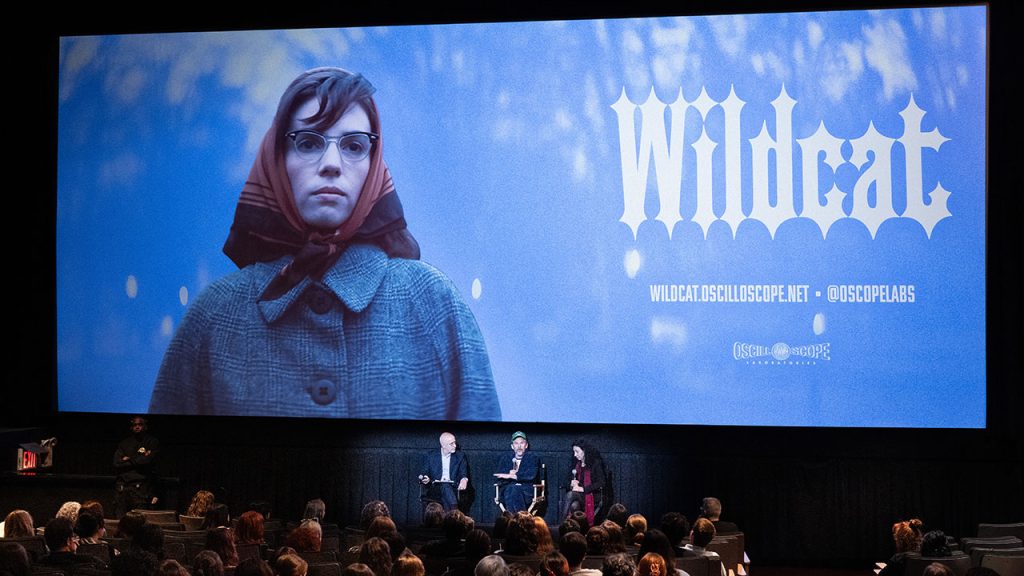
A Writer’s Complexities
Although his mother had introduced him to O’Connor when he was a child, Hawke said, reading Radical Ambivalence helped him better understand how complex a person O’Connor was. He mentioned the book in an essay he wrote for Variety explaining why he and Maya ultimately decided to go forward with the film.
“I’m just so grateful for your time and for your enthusiasm and open-mindedness,” he said of O’Donnell’s writings on O’Connor. “I can’t imagine knowing as much as you know about Flannery. I have to bottle it into an hour and a half.”
O’Donnell said the Variety article was the first time she learned that Hawke had read her book, and said she was deeply moved by the film.
“When I wrote the book, I was hoping that it was going to be useful to people in some way and not just something that academics would read,” she said.
Hawke credited Maya with pushing the film to completion and suggested that O’Connor’s faith, coupled with her unflinching exploration of the way religion and morality sometimes collide in horrific ways, makes her appealing to a generation that is otherwise turning away from organized religion.
“A lot of people are scared to talk about faith. If we were all at Thanksgiving dinner together and I said, ‘Hey, can we talk about God?’ about half of you would go to the bathroom because you’re worried people are going to have an agenda,” he said.
“What I try to do with the movie is model Ms. O’Connor, which is that she’s not trying to convince you to believe anything. She’s trying to be a good artist and present something for you.”
]]>Answering a call from Pope Francis, Fordham is indeed a place committed to taking “concrete actions in the care of our common home.”
Here are some updates from the first quarter of 2024, from student sustainability interns to “cool” foods to fun community events that make an impact.
Facilities
In January, 11 more undergraduate students joined Fordham’s Office of Facilities Management as sustainability interns to help the University in its efforts to reduce its carbon emissions. They’re working on projects connected to AI-enabled energy systems, non-tree-based substitutes for paper, and composting. The office is still looking for three more students to join; email Vincent Burke at [email protected] for more information.
Dining
Stroll into a dining facility at the Rose Hill or Lincoln Center campus, and you’ll find “Cool Food” dishes such as crispy chicken summer salad, California taco salad, and spicy shrimp and penne.
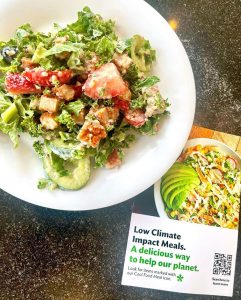
The dishes, which are marked by a distinctive green icon at the serving station, have a higher percentage of vegetables, legumes, and grains, which generally have a lower carbon footprint than those with beef, lamb, and dairy. According to the World Resources Institute—which Fordham partnered with on the Cool Food project—more than one-quarter of the world’s greenhouse emissions come from food production.
In March, the University went one step further by signing onto the New York City Mayor’s Office Plant-Powered Carbon Challenge. The pledge commits Fordham and Aramark to reduce our food-supply carbon emissions by a minimum of 25% by the year 2030.
Academics
This semester, a new one-credit, university-wide experiential learning seminar titled Common Home: Introduction to Sustainability and Environmental Justice was taught by faculty and staff from the Gabelli School, the Center for Community Engaged Learning, the Department of Facilities, the Department of Biology, and the Department of Theology.
Other sustainability-focused courses this semester include the City and Climate Change, the Physics of Climate Change, and You Are What You Eat: the Anthropology of Food (Arts and Sciences); Sustainable Reporting and Sustainable Fashion (Gabelli School of Business); and Energy Law and Climate Change Law and Policy (Law).
Did You Know?
Like most buildings in New York City, the ones on the Rose Hill campus get almost all of their power from power plants fueled by natural gas (along with some solar power). To power a building like Walsh Library, a natural gas-powered plant normally uses 37 million gallons of water annually. But fuel cells like the ones that were installed at the Walsh Library in 2019 actually make their own water, and as as result, Fordham is saving the community the equivalent of 57 Olympic-sized pools each year.
Students Take the Lead
At Fordham Law School, the student-run Environmental Law Review hosted a March 14 symposium that considered the impact of artificial intelligence on environmental law. Panels focused on how regulators and litigators can use AI and the challenge of addressing AI-generated climate misinformation.
In January, Fordham Law student Rachel Arone wrote The EPA Rejected Stricter Regulations for Factory Farm Water Pollution: What This Means, Where Things Stand, and What You Can Do for the Environmental Law Review. And the Law School’s student-faculty-staff collective Climate Law Equity Sustainability Initiative held a series of lunchtime discussions about climate change, law, and policy.
Student groups LC Environmental Club and Fashion for Philanthropy teamed up on March 8 to create reusable tote bags on International Women’s Day. The bags were donated to Womankind, which works with survivors of domestic/sexual violence and trafficking.
The United Student Government Sustainability Committee continues to run the Fordham Flea, a student-run thrift shop that connects students interested in selling old clothes with those looking to buy sustainably. The next flea will take place on April 26 from 11 a.m. to 2 p.m. outside of the McShane Center.
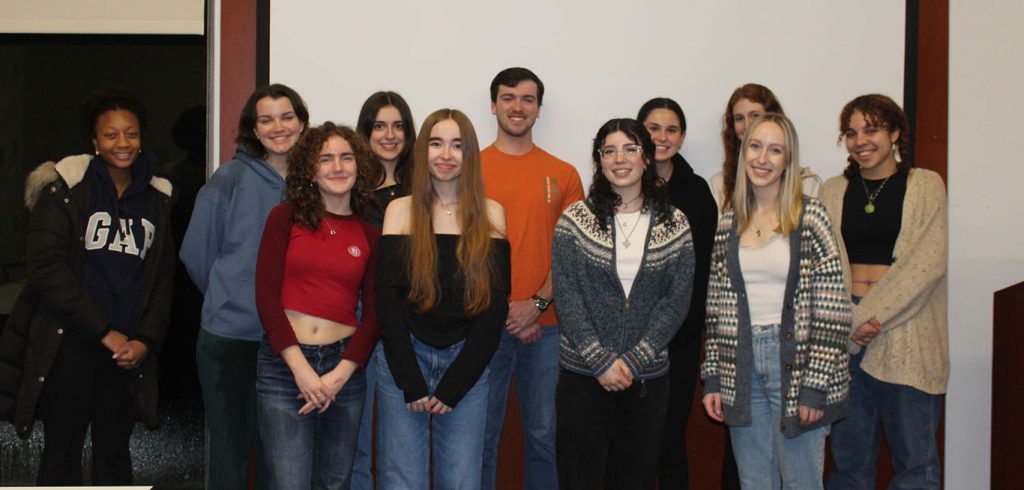
Community Engagement
The Center for Community Engaged Learning (CCEL) held an Urban Agriculture and Food Security Roundtable on Feb. 2. The gathering brought together community organizations and leaders from the Bronx to discuss urban agriculture and food security. Attended by Bronx Congressman Ritchie Torres, the meeting was also an opportunity for groups to learn about resources available from the USDA and the New York City Mayor’s Office on Urban Agriculture.
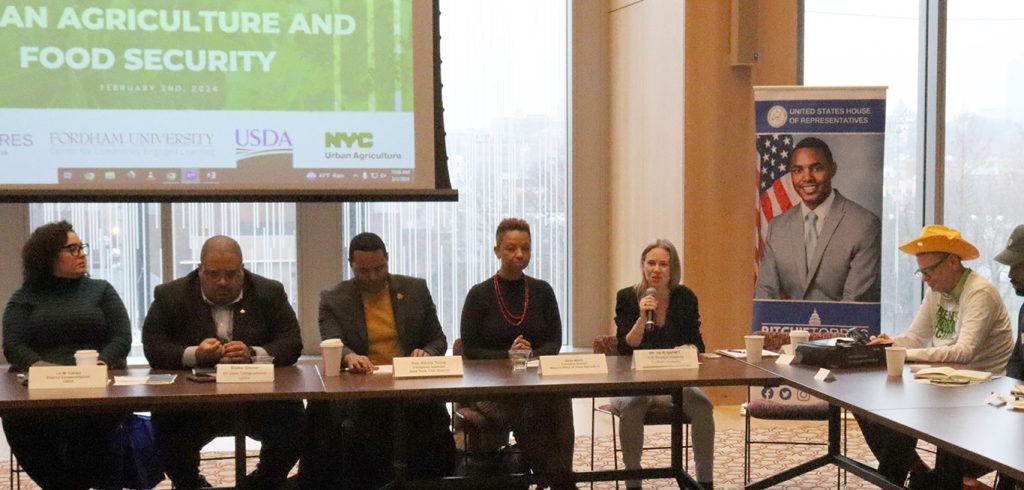
CCEL Director of Campus and Community Engagement Surey Miranda-Alarcon served as a panelist at a March 9 climate justice workshop at SOMOS 2024 in Albany, along with Mirtha Colon, GSS ’98, and Murad Awawdeh, PCS ’19.
Faculty News
David Gibson, director of the Center on Religion and Culture, and Julie Gafney, Ph.D., director of the Center for Community Engaged Learning, attended “Laudato Si’: Protecting Our Common Home, Building Our Common Church” conference at the University of San Diego on Feb. 22 and 23.
Marc Conte, Ph.D., professor of economics, and Steve Holler, Ph.D., associate professor of physics, presented their research around air quality, STEM education, and education outcomes on March 11 at the first night of Bronx Appreciation Week, which the Fordham Diversity Action Coalition organized.
Alumni
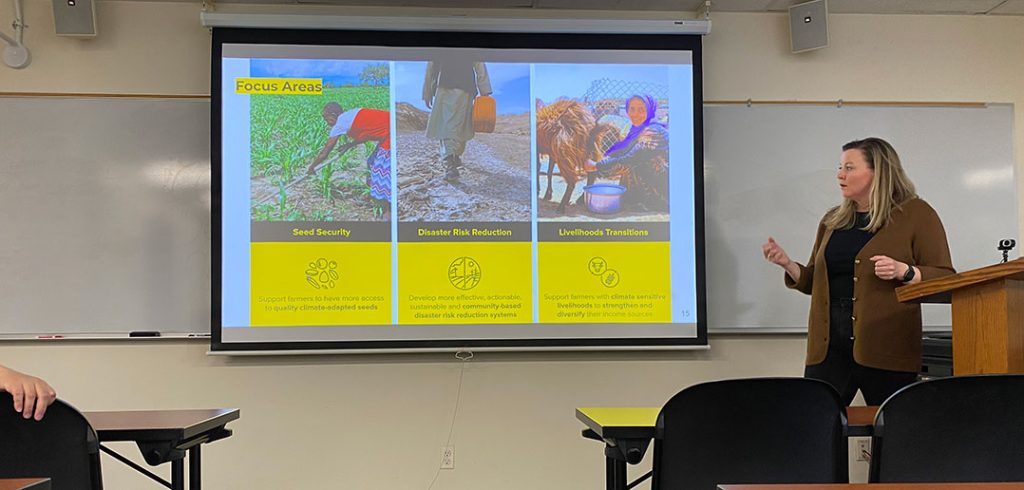
On March 14, Tara Clerkin, GSAS ’13, director of climate research and innovation at the International Rescue Committee, delivered a lecture at the Rose Hill campus titled “The Epicenter of Crisis: Climate and Conflict Driving Humanitarian Need and Displacement.”
In Case You Missed It
Here are some sustainability-related stories that you may have missed: In January, economics professor Marc Conte published the findings of a study that examined whether people living in areas with more air pollution suffer more from the coronavirus. The Gabelli School of Business partnered with Net Impact, a nonprofit organization for students and professionals interested in using business skills in support of social and environmental causes. A group of the Gabelli School Ignite Scholars traveled to the Carolina Textile District in Morgantown, North Carolina, to learn the benefits of sustainable and ethical manufacturing.
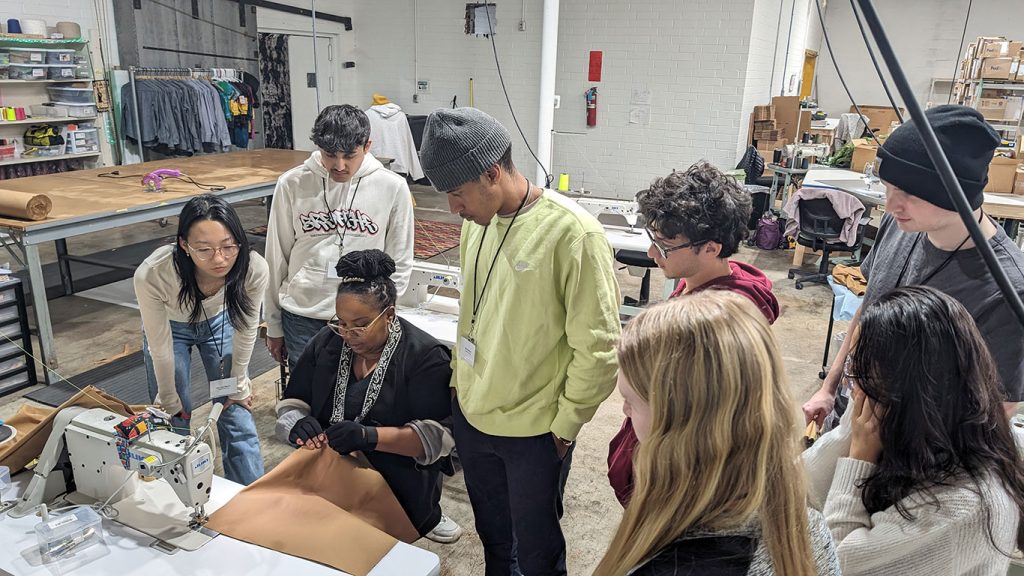
Upcoming Events
April 12 and 19
Poe Park Clean-up
In celebration of Earth Day on April 22, the Center for Community Engaged Learning is organizing visits to the park, where volunteers can help pull weeds and spread mulch. 10 a.m. – 2 p.m., 2640 Grand Concourse, the Bronx. Sign up here.
April 13
Bird Watching in Central Park
Law professor Howard Erichson will lead students on a birdwatching tour of Central Park, where they hope to spot and identify a few of the hundreds of species that pass through Fordham’s backyard on their annual migration routes. Meet at the Law School lobby at 9:30 a.m. Contact [email protected] to reserve a spot.
April 13
Ignatian Day of Service
Students and alumni will meet at the Lincoln Center campus and walk over to nearby Harborview Terrace, where they will build a community garden with residents. Lunch and a conversation about Ignatian leadership will follow. 10 a.m. – 2 p.m.
Click here to RSVP.
April 15
ASHRAE NY Climate Crisis Meeting
The theme of this meeting of the American Society of Heating, Refrigerating, and Air-Conditioning Engineers is “Challenge Accepted: Tackling the Climate Crisis.” All are welcome.
7 a.m.- 1 p.m., Lincoln Center Campus. Contact Nelida LaBate at [email protected] for more information or register here using code FordhamStudent2024.
We’d Love to Hear From You!
Do you have a sustainability-related event, development, or news item you’d like to share? Contact Patrick Verel at [email protected].
]]>Drawing from his experience as a former journalist who extensively covered Pope Francis, Gibson provided valuable commentary on the pope’s motivations and intentions behind the memoir.
According to Gibson, Pope Francis aims to humanize himself, emphasizing his relatability and shared experiences with everyday people. “He’s as surprised to find himself pope as anybody else, and he wants people to know that he’s had the ordinary experiences of everyone else,” said Gibson.
Thompson posed the question of whether this memoir is Pope Francis’ attempt to shape his legacy, to which Gibson responded affirmatively, “Yes, this really is Pope Francis trying to write his own legacy, set the record straight, and say, ‘This is what I meant. This is what I tried to do as pope. This is how I saw the church and the world at this time. That’s the record. That’s it.’”
Watch Pope Francis attempts to demystify Catholic Church in new memoir.
The document set forth an ambitious seven-year plan for the University that touches on everything from facilities and curriculum to student involvement, all with the ultimate goal of combating climate change.
Just this month, Fordham received a $50 million grant from the Environmental Protection Agency that the University will use to team up with community partners to address the issue.
Below are a few of the sustainability-related efforts, developments, and accomplishments that took place in the final quarter of 2023. Look for more updates in 2024!
Facilities
Going Hybrid
On Oct. 23, three hybrid minivans, including a wheelchair-accessible minivan, joined the fleet of Fordham’s Ram Vans. They replace gas-powered minivans previously used for wheelchair-accessible requests, trips to the Calder Center, and charter trip services. The vans use less gas, produce less CO₂, and can run up to 560 miles on one tank of gas.
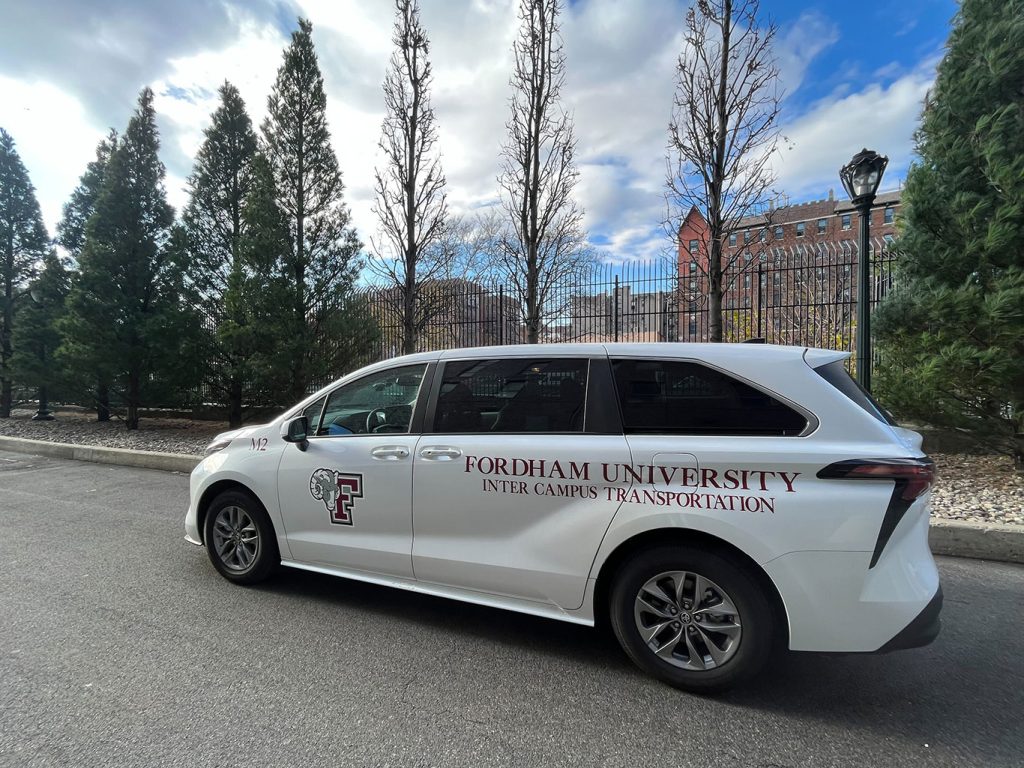
Dining
Micro Farms
This fall, Aramark installed vertical hydroponic units called Babylon Micro Farms at dining halls on the Lincoln Center and Rose Hill campuses. They grow fresh greens and herbs in a water-based solution (instead of soil, which requires frequent watering.) The greens are harvested for use in dining hall dishes and special student events.
Compared to traditional methods, each micro farm uses 96% less water, zero pesticides, 65% less fertilizer, and zero miles to transport. As a result, between January and June 2023, using them allowed Fordham to save 19,247 gallons of water, prevent 2.5 pounds of nitrogen from entering waterways, and reduce 32 pounds of food waste.
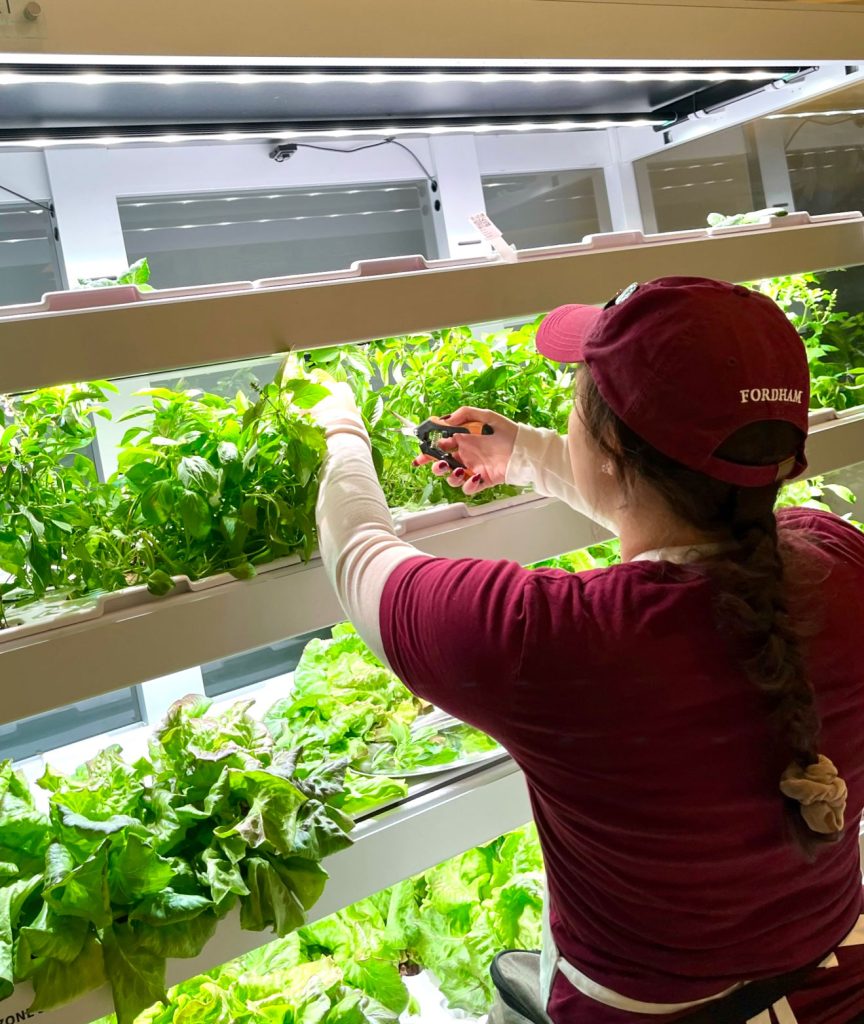
Academics
In the Classroom
Six undergraduate community-engaged learning classes offered in the Fall 2023 semester featured elements promoting sustainability: Anthropology of Food (Anthropology), Economics and Ecology of Food Systems (Economics), Thinking Visually (Visual Arts), Human Physiology (Biology), Consumer Behavior (Gabelli School of Business), and Leadership Integrated Project (Gabelli School of Business). At Fordham Law School, environmental law courses offered this semester included Environmental Law and Energy Law.
Fordham Law students wrote blog posts for the school’s Environmental Law Review on the Flint and Jackson water crises, NYC Local Law 97, the environmental damage caused by the fashion industry, and cell-cultivated meats.
Reading Laudato Si’
The Curran Center for American Catholic Studies held three seminars on Zoom this semester dedicated to reading Pope Francis’ encyclical Laudato Si’ and the 2023 follow-up, Laudate Deum. Visit the center’s website for more information on future seminars.
A Systems Approach
This semester, the Social Innovation Collaboratory and Career Center hosted a collaborative workshop on systems thinking, focused mainly on sustainability. The workshops, which were open to all undergraduate students, allowed them to explore the practice and application of systems thinking, which is rooted in a holistic approach to society’s more complex issues. The process is attractive to companies since it’s rooted in the idea of looking at complex problems with a new perspective. Contact Sadibou Sylla at the Collaborary for information on future workshops.
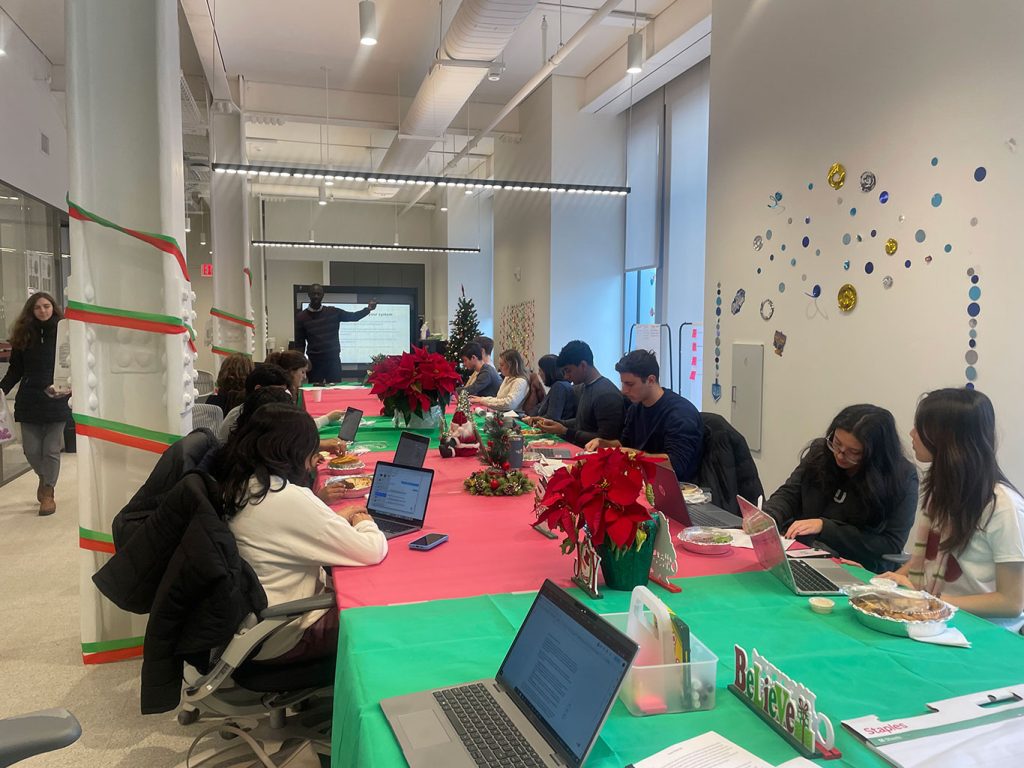
Students Take the Lead
Green Week: United Student Government sponsored Fordham College at Rose Hill’s Sustainability Week in November. It featured the Fordham Flea Pop-Up as well as a seminar on composting basics.
The Lincoln Center Environmental Club held a clean makeup tabling event on Nov. 30 to showcase the benefits of cruelty-free and clean makeup.
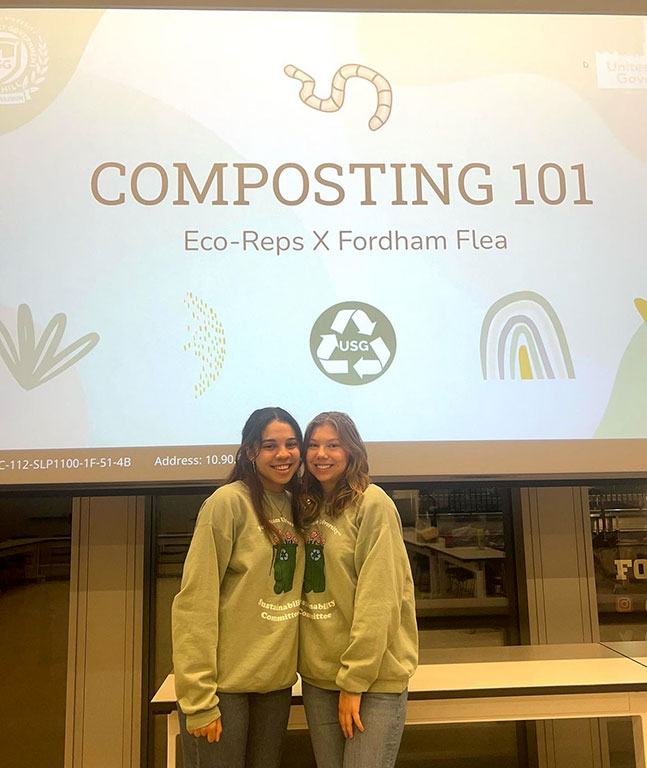
Community Engagement
As part of the Reimagine the Cross Bronx campaign, Fordham staff conducted weekend “walkshops” in the neighborhoods surrounding the highway. Funding came from a $25,000 grant from the New York City Department (DOT) that the Center for Community Engaged Learning received in October.
Fordham staff and students also held special Halloween and Thanksgiving-themed events at the Highbridge Farmers Market and community space, which was recently expanded thanks to an AARP grant.
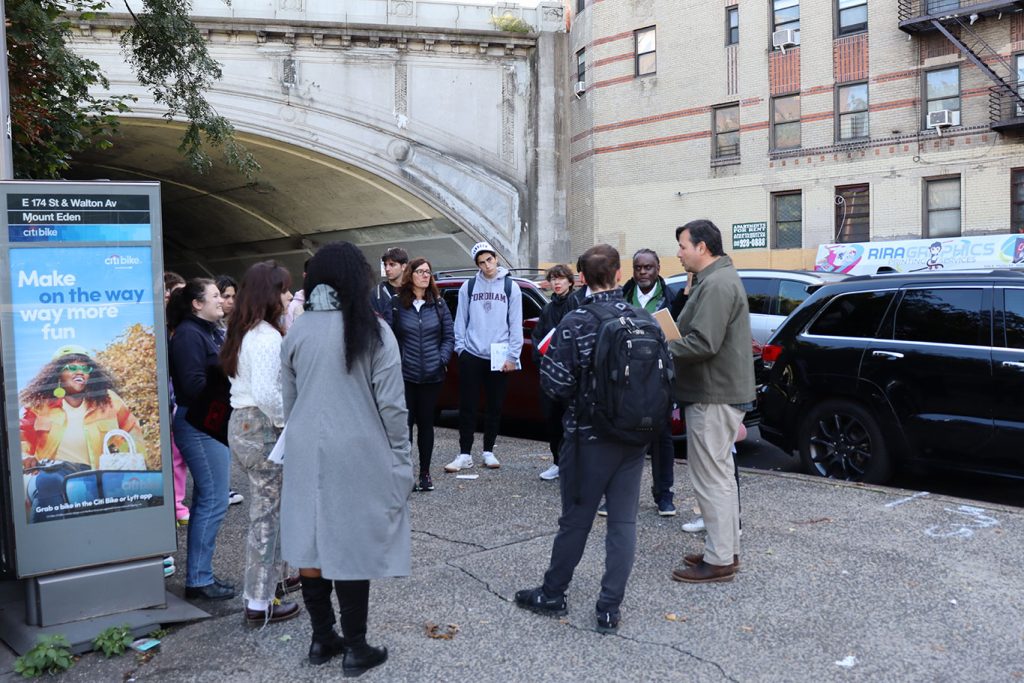
Faculty News
Marc Conte, Ph.D., professor of economics, published “Unequal Climate Impacts on Global Values of Natural Capital” in the journal Nature.
Stephen Holler, Ph.D., associate professor of physics, published “Education for Environmental Justice: The Fordham Regional Environmental Sensor for Healthy Air,” in the journal Social Sciences.
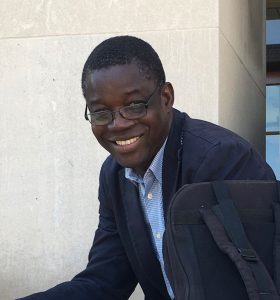
David Gibson, director of the Center for Religion and Culture (CRC), received $84,840 from the Porticus Foundation for the annual conference The Way Forward: Laudato Si’, Protecting Our Common Home, Building Our Common Church. The conference will take place in February at the University of San Diego.
Isaie Dougnon, Ph.D., associate professor of French and Francophone Studies and International Humanitarian Affairs, received $24,790 from the Wenner-Gren Foundation for research based on a local perspective on water and migration in West Africa.
Alumni
Giselle Schmitz, GSAS ’22, spent this fall working with the Coral Triangle Center in Bali, Indonesia—a nonprofit that connects governments, corporations, and local groups to help strengthen marine resources in the region.
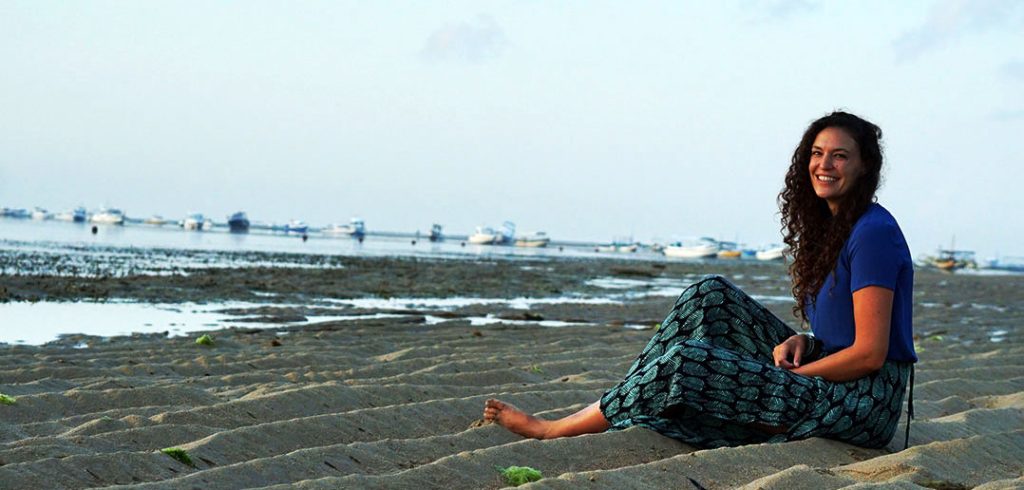
In Case You Missed It
It was a busy fall in terms of sustainability efforts! Here are some stories Fordham News covered that you may have missed: In October, the annual Fordham Women’s Summit focused on sustainability. In our theology department, a lecture for first-year students featuring Union Theological Seminary professor John J. Thatamanil connected religious supremacy to the destruction of the natural world. Four students have joined the Office of Facilities Management’s newly created internship program, while alumni are helping protect New York City’s birds and helping farmers adapt to climate change. The Gabelli School of Business hosted two Nobel Laureates at a conference on ESG. At the Law School, more than 20 students gathered in Central Park for a clean-up event for the annual Public Service Day, while alumna Melinda Baglio was honored for being a changemaker in the clean energy field.
Upcoming Events
Faculty Happy Hour: Sustainability and Environmental Justice
Open to all faculty interested in sharing ideas about sustainability.
Thursday, Jan. 18, 2024. RSVP: Julie Gafney, [email protected]
STEM Career Fair, Thursday, Feb. 15, Great Hall, Rose Hill Campus. Visit the Fordham Career Center next month for details.
Women of Color in STEM Career Panel, Wednesday, Feb. 28, Virtual. Visit the Fordham Career Center next month for details.
Social Impact and Non-Profit Micro-Fair, Thursday, March 14, 12th Floor Lounge, Lowenstein Center, Lincoln Center campus. Visit the Fordham Career Center next month for details.
Save the Date:
Climate Action Summit with President Tetlow: April 8, Rose Hill Campus
We’d Love to Hear From You!
Do you have a sustainability-related event, development, or news item you’d like to share? Contact Patrick Verel at [email protected].
]]>The gathering was convened by the pope so that representatives from all areas of the church, from cardinals to lay people, could focus on synodality–the process of working together on how the church will move forward. This meeting is the first of its kind to include women as voting delegates.
“I feel so blessed to be a part of this,” said Mollie Clark, a Fordham junior.
“Women’s voices are being honored and heard for the first time in the synodal process. This is such an affirming thing,” said Clark, who acknowledged “a lot of internal struggle at times” with the church’s stance on women’s participation. “I know that God is listening to my voice.”
A Global Conference
David Gibson, director of Fordham’s Center on Religion and Culture and a former Vatican reporter who will accompany the group, said, “It’s simply a global conversation that is the fruit of two years of listening.”
Pope Francis asked for churches and dioceses all over the world to survey clergy and lay members alike as a prelude to the meeting, which he opened on Oct. 4. As part of this process of synodality, or “journeying together,” the same discussions were happening in nations across the globe about how to be a more inclusive church, a less clerical church, said Gibson, as well as how to increase the role of women and young people.
Fordham is the only Jesuit university to send a student group to Rome for this synod convened by Pope Francis–the first Jesuit pope.
Church on the Go
In the spring, Vanessa Rotondo, Fordham adjunct professor and deputy chief of staff to the University’s president, Tania Tetlow, organized a screening of the Hulu documentary The Pope: Answers and was amazed at the high student turnout.
That event inspired her to propose a course called Church on the GO: Theology in a Global Synod to further “develop student understanding of the postmodern church in tandem with and in light of the Synod on Synodality.” Earlier this year, she traveled to Rome to pursue permission for its students to take part in synod-related events.
Student Itinerary
Rotondo and Gibson developed a series of activities for the students while they are in Rome. They will hear from synodal leaders such as Sister Nathalie Becquart, a voting member who helped facilitate the pope’s canvassing of church members worldwide; join press conferences; and take part in community engagement projects with both Villa Nazareth, a house of humanistic and spiritual formation for college students, and Sant’Egidio, a social service agency focused on global peace and interfaith dialogue. The group will also spend time at the School of Peace, where they will participate in an interfaith prayer service and prepare and distribute meals to people experiencing hunger and homelessness.
Rotondo also devised two leadership sessions with the grassroots organization Discerning Deacons that are rooted in active listening and the synodal process. The goal is to give the students a sense of how the synod is working and train them in Ignatian reflection so they can devise an action plan to enhance Fordham’s mission and Catholic identity when they return.
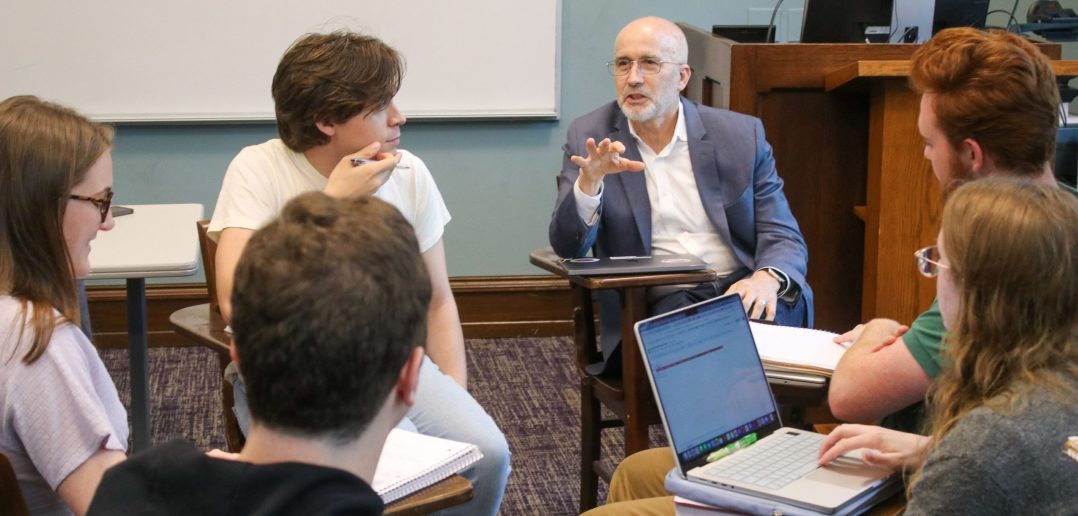
‘Our Church is Alive’
AnnaMarie Pacione, a Fordham sophomore in the group, said the synod gives her hope.
“Our church is alive, and it’s growing, and it’s breathing and listening to everyone, as it should,” she said. “It’s more reflective of God’s love, Jesus’s love, as I know it, with this commitment and responsibility to listen to voices that have been suppressed in the past.”
A Blog for Dispatches
The students will post to the Sapientia blog of Fordham’s Center on Religion and Culture throughout their weeklong trip and will document their experience on the Instagram account @synodalfordham.
In addition to Clark and Pacione, the Fordham students include Eli Taylor, a theology master’s student; Fordham College at Rose Hill seniors Augustine Preziosi and Sean Power; Fordham College at Rose Hill junior James Haddad; Fordham College at Rose Hill sophomores Abigail Adams, Seamus Dougherty, Jay Doherty, and Kaitlyn Squyres; and Fordham College at Lincoln Center junior William Gualtiere.
John Cecero, S.J., Fordham’s vice president for mission integration and ministry, and Michael Lee, Ph.D., director of the Francis & Ann Curran Center for American Catholic Studies, are accompanying the group.
]]>Increasing extreme weather conditions like record-high temperatures and devastating droughts are undoubtedly the result of “unchecked human intervention on nature,” Pope Francis declared in a letter published today expanding on his 2015 Laudato Si’ encyclical.
Since that publication, he said, “I have realized that our responses have not been adequate, while the world in which we live is collapsing and may be nearing the breaking point.”
Pope Francis called out the United States, specifically, in this new apostolic exhortation, titled Laudate Deum, issued on the first day of the Synod on Synodality.
“If we consider that emissions per individual in the United States are about two times greater than those of individuals living in China, and about seven times greater than the average of the poorest countries, we can state that a broad change in the irresponsible lifestyle connected with the Western model would have a significant long-term impact,” he said.
“The ethical decadence of real power is disguised thanks to marketing and false information, useful tools in the hands of those with greater resources to employ them to shape public opinion,” he wrote.
Pope Francis’s Specificity Is ‘Not Accidental’
Christiana Zenner, an associate professor of theology, science, and ethics at Fordham, said, “This is a document that doubles down morally on the centrality of climate crises and the immediate responsibility of ‘all people of good will’ to address them.”
“Pope Francis first dismantles climate denialism by careful arguments, data, precision of terms, and strategic citation of the climate-recidivistic U.S. Conference of Catholic Bishops,” Zenner said. “And the penultimate paragraph of the exhortation likewise identifies the ways that U.S.-based climate exceptionalism is problematic. This is as specific about national responsibilities as a pope ever gets, and it is definitely not accidental here.”
The publication coincides with the upcoming U.N. climate change conference that will convene in Dubai in November, much like the release of the 2015 encyclical ahead of the Paris climate conference. The pontiff laments that the Paris Agreement has been poorly implemented, lacking effective tools to force compliance.
“International negotiations cannot make significant progress due to positions taken by countries which place their national interests above the global common good,” he wrote.
Never Mind the Bedroom, ‘the Entire House Will Burn Down’
David Gibson, director of Fordham’s Center on Religion and Culture, said the new publication shifts the controversy among American Catholics from sex to climate change—which has the potential to be even more contentious.
“The focus and controversy in the church that Pope Francis leads has lately been directed toward issues of sex and sexuality and his efforts to make Catholicism more inclusive. The irony is that this papal exhortation will likely be even more controversial for Americans than any issue of sexuality because it demands fundamental changes in our consumerist lifestyles.”
Gibson added, “Many American Catholics want the church to focus on what people do in the bedroom. Pope Francis is saying the entire house will burn down if we don’t change our behavior in every other aspect of our lives.”
]]>Taking the name Francis, he became the first pope to be a member of the Society of Jesus, the first from the Americas, the first from the Southern hemisphere, and the first from outside Europe since the eighth century.
At Fordham, faculty and staff reacted to the news with words like “shocked” and “an ingenious choice.” Two years later, when the pope visited New York City as part of his first visit to the United States, members of the Fordham community flocked to Central Park to catch a glimpse of him and shared their hopes for his tenure.
“As the first Jesuit to serve as pope, Francis has done the work of St. Ignatius, reminding the faithful of the central values of the Gospels and calling us to action,” said Tania Tetlow, president of Fordham.
“As a Jesuit community, Fordham celebrates the Pope’s tenth anniversary in the chair of St. Peter, and we wish him all the blessings of faith in his holy work.”
On the cusp of his 10th anniversary, Fordham News spoke with experts on the impact Francis has made on the papacy as an institution, race and gender, and the environment.
Thomas Worcester, S.J., professor of history and co-editor of The Papacy since 1500: From Italian Prince to Universal Pastor. Cambridge (Cambridge University Press, 2010)
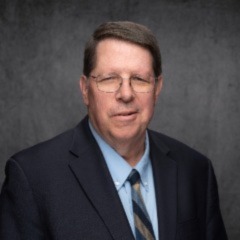 I think Pope Francis grew into the job. He likes the pastoral side of it very much. Compassion and mercy are what the church should be about, and I think he exudes that himself and the style he has as pope.
I think Pope Francis grew into the job. He likes the pastoral side of it very much. Compassion and mercy are what the church should be about, and I think he exudes that himself and the style he has as pope.
He’s not as happy dealing with the Roman Curia. The pope is supposed to be a unifier in the church, and I think he wants to be that. In some ways, his inclination is toward reform, and yet at the same time, there’s a caution in him, which I think all folks have to some extent.
He makes clear that change is not just possible, but desirable. Just the very fact that he understands synodality as something that has an emphasis on listening—that the pope himself needs to listen to not just other bishops, but more broadly than that—is a major change from a style that was more top-down for much of the history of the papacy.
There are some aspects of his leadership that are also very Jesuit. Some have said that those who favor access to abortion for women should not receive communion. Francis is totally against that. He makes clear that the Eucharist is not a “prize for the perfect,” but a “medicine for the weak.” He’s got a good grounding in that. In the past, Jesuits have traditionally been favorable to people receiving communion frequently, with relatively few obstacles. That’s an area where I think Francis is very Jesuit, with an emphasis on access to mercy.
Bryan Massingale, S.T.D., professor of theology and the James and Nancy Buckman Chair in Applied Christian Ethics
He will go down as one of the most consequential popes in modern church history because his signal accomplishment has been to foster a community of open dialogue and discussion.
I never thought I would ever hear a pope say words like, ‘Who am I to judge?’ the way he did in 2013, in response to a question about gay priests.
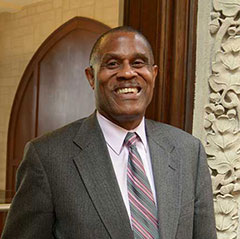 The phrasing reverses the average person’s understanding of the church’s relationship with gay and lesbian people. Before then, the Catholic church was seen as very judgmental of LGBTQ persons and very hostile and unapproving of LGBTQ relationships. That single question ushered in a whole new era and effectively challenged that stance of knee-jerk condemnation that the Catholic church has been more associated with.
The phrasing reverses the average person’s understanding of the church’s relationship with gay and lesbian people. Before then, the Catholic church was seen as very judgmental of LGBTQ persons and very hostile and unapproving of LGBTQ relationships. That single question ushered in a whole new era and effectively challenged that stance of knee-jerk condemnation that the Catholic church has been more associated with.
More than any other pope, I think that Francis also has taken on racism as a major challenge to the Christian conscience. After George Floyd was murdered in 2020, that week in his general audience in Rome, he took a very unusual step of praying for him by name. Then he followed that with a statement that was really important. He said, ‘We cannot tolerate or turn a blind eye to racism and exclusion in any form, and yet claim to defend the sacredness of every human life.’
What’s brilliant about that is how he grounds the opposition to racism within the church’s commitment to a pro-life stance and the sacredness of every human life. He very much put his cards on the table that safeguarding the dignity of Black lives is part of the respect owed to every human life. The fact that that statement was not picked up a lot by the American bishops or pro-life Catholics in the United States shows that Francis has a more prophetic understanding of the implications of being pro-life than many American Catholics are comfortable with, especially when it comes to racism.
David Gibson, director of Fordham’s Center on Religion and Culture
 It’s been a remarkable time, and for so many people it’s been inspiring. It’s as though the windows are open and light and fresh air are coming in. For another segment of the church, that’s a very unsettling, even threatening prospect. So his papacy has sparked far more backlash than I expected. But the backlash and the opposition to Francis make you realize how much this was needed in the church. There have been so many decades of quashing dissent or even discussion, and now people are free to speak their minds.
It’s been a remarkable time, and for so many people it’s been inspiring. It’s as though the windows are open and light and fresh air are coming in. For another segment of the church, that’s a very unsettling, even threatening prospect. So his papacy has sparked far more backlash than I expected. But the backlash and the opposition to Francis make you realize how much this was needed in the church. There have been so many decades of quashing dissent or even discussion, and now people are free to speak their minds.
It’s interesting that so much of the fierce opposition has come from a certain segment of American Catholics. I think it’s important to keep it in perspective. The U.S. Church counts for about 5% of the global Catholic population of 1.3 billion. The opposition to Francis is relatively small, but it is very vocal, and very passionate, to the point of even being destructive.
He’s made it so clear that everybody should be free to speak their mind, and that no topic is out of bounds. For a center that is founded on public discussion, that’s oxygen for us. Francis has also stressed the importance of culture as a connecting tissue for different people. I totally agree. Culture provides a rare piece of common ground for discussions. People can come together over the arts and literature and other cultural manifestations.
He’s elevated the role of lay people, especially women. At the Vatican, putting them in offices over clerics—that’s unheard of. But there are still concrete steps that need to be taken in order to have any difference on the ground. Laypeople need to be able to preach. Women need to be able to preach. Women need to be ordained as deacons. Unless there’s some upsurge in priestly vocations, which doesn’t seem likely, there need to be other things that are going to affect changes on the ground in parishes.
Christiana Zenner, Ph.D., associate professor of theology, science, and ethics
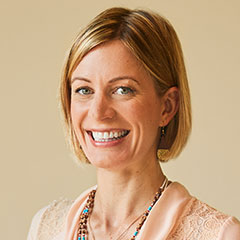 One of the things that has continued to surprise and delight me and other watchers of ecological ethics is how Francis’ encyclical about the environment, Laudato Si’ continues to resonate with people of many faiths, as well as those with none. The planetary reach of that document seems to be real. People ranging from secular Jewish feminists to atheist students to “cradle to grave” Catholics have all found things to love in this document.
One of the things that has continued to surprise and delight me and other watchers of ecological ethics is how Francis’ encyclical about the environment, Laudato Si’ continues to resonate with people of many faiths, as well as those with none. The planetary reach of that document seems to be real. People ranging from secular Jewish feminists to atheist students to “cradle to grave” Catholics have all found things to love in this document.
What’s distinctive to him in the contemporary era is the way that this encyclical is part and parcel of how he walks the walk and talks the talk. Popes can write lots of documents that have different kinds of impact, but it seems to me that Pope Francis has also really tried to embody what’s in this document. He has worked interreligiously on climate change and environmental refugees and migration more generally by talking about global capitalism and its excesses and has by himself modeled a more modest approach, from his domestic quarters to the footwear he chooses. So I think that it is a document with which his own personal charism is uniquely integrated and I think for that reason it will be a lasting legacy of his papacy.
Pope Francis also talks a lot about the wisdom of indigenous cultures and ecological values, and the primacy that ought to be accorded to indigenous communities before major projects are done on their land. This is a pretty radical statement for a historically universalizing, colonizing church.
So I would love to see him and the Catholic church continue to explore what it means to live up to those best ideals.
]]>Known for his theological brilliance, Benedict drew praise from many Catholics for his commitment to church orthodoxy amidst rising secularism. He also drew criticism during his papacy for accusations of corruption in the Vatican Bank, and what many deemed a too-little-too-late response to the clergy sex abuse crisis that rocked the church. When he retired—the first pope to do so in 600 years—he was given the title of pope emeritus.
Before he was elected pope in 2005, Benedict, a German theologian who was then Cardinal Joseph Ratzinger, served as head of the Vatican’s Congregation for the Doctrine of the Faith—a post he was chosen for by Pope John Paul II in 1981. In that role, he reasserted a classical stance on the Catholic faith in the face of pastoral experimentation and growing religious pluralism.
During his 2008 visit to the U.S., Pope Benedict delivered an address to Catholic educators at Catholic University in Washington, D.C., in which he said “Education is integral to the mission of the Church to proclaim the Good News. First and foremost every Catholic educational institution is a place to encounter the living God who in Jesus Christ reveals his transforming love and truth.”
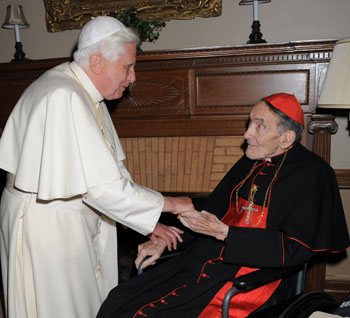
Fordham faculty, staff, and students took part in a number of activities during that visit, including Masses at St. Patrick’s Cathedral and Yankee Stadium, Benedict’s meetings with Catholic youth, and his departure ceremony at John F. Kennedy Airport. Fordham President Emeritus Joseph M. McShane, S.J., served as emissary for the Orthodox Christian hierarchs attending an ecumenical gathering marking Pope Benedict’s first visit to St. Joseph’s Roman Catholic Church. Benedict also met with Avery Cardinal Dulles, a former Fordham faculty member, who presented the pontiff with a copy of a book of lectures he delivered at Fordham: Church and Society: The Laurence J. McGinley Lectures, 1988-2007 (Fordham University Press, 2008).
Pope Benedict XVI’s funeral will be held on Jan. 5 in St. Peter’s Square, the Vatican said, with Pope Francis presiding. His body will be laid in St. Peter’s Basilica on Monday so that the faithful can pay their respects.
Below, Fordham faculty share their thoughts on Pope Benedict’s influence and legacy.
David Gibson
Director, Center on Religion and Culture
Author of The Rule of Benedict: Pope Benedict XVI and His Battle with the Modern World
Benedict XVI is being remembered, and revered by many, for his role as pope and the progress and controversies that accompanied his eight-year pontificate. But his chief legacy as pope will likely be his decision to resign the papacy, the first pope to do so in 600 years. That decision broke a certain mystique that had built up around the popes, and it freed his successors to step down when they see fit.
But beyond that it should be noted that his real legacy will be the nearly 25 years he spent as the chief doctrinal enforcer to his predecessor John Paul II. As Cardinal Joseph Ratzinger, the man who would be elected Benedict XVI shaped the conservative form that marks Catholicism today, and will for many years to come. His intellectual and ecclesial patrimony is arguably more influential than that of John Paul himself.
Bryan N. Massingale, S.T.D.
James and Nancy Buckman Chair in Applied Christian Ethics
Professor of Theological and Social Ethics
Senior Fellow, Center for Ethics Education
Pope Benedict was a gifted scholar and brilliant theologian. Yet his thinking at times could be abstract and distant from the everyday lives of many Catholics. He prioritized a Eurocentric understanding of Catholicism over adaptation to local cultures. He saw Western European culture as the norm for Catholic worship and theological expression. For example, on his 2009 journey to Cameroon and Angola, Benedict criticized condoms as aggravating the AIDS epidemic, despite the fact that the continent was an epicenter for the disease’s massive suffering and death. During his 2011 visit to the African country of Benin, organ music was used at the Masses he celebrated [as opposed to drumming and traditional dance]because he believed it to be more consistent with the dignity that was due a papal liturgy. I believe that history will show that Benedict leaves a complicated legacy as a leader who was a brilliant scholar who struggled to appreciate the global and cultural diversity of the Catholic Church.
Bradford Hinze, Ph.D.
Karl Rahner, S.J., Professor of Theology at Fordham
Early in his career Joseph Ratzinger earned a reputation as an accomplished theologian with expertise in early and medieval European Catholic theology. He became a respected contributor to the proceedings of the Second Vatican Council and a proponent of a dialogical approach to revelation, the sacraments, and the church. But in the decades that followed the council, he became increasingly critical of the use of dialogical deliberation and decision-making in the church in practices of collegiality and synodality, and in democratic societies.
As head of the Congregation of the Doctrine of the Faith, he promoted the investigation, interrogation, and disciplining of many theologians linked with progressive currents in theology in Europe, North America, and in the Global South focused on liberation, inculturation, and religious pluralism.
Since Benedict has retired, the church has, under the leadership of Pope Francis, been returned to the position of the majority of bishops heralded at the Second Vatican council that sought to reform the church by engaging in open and honest dialogue in the church and by promoting receptive dialogue with the modern world, with members of other Christian churches, of other religions, and by ushering a new global vision of the church and a polycentric understanding of Catholicism.
]]>“Our discussion is unique in this series in that—appropriately for a center dedicated to examining questions related to religion and culture—we wanted to look at the spiritual and religious aspects of what some believe is a new wave of censoriousness and intolerance in American society,” said David Gibson, director of the center and the panel’s moderator. “I wonder if this isn’t just one of the issues at stake, but is in fact, the issue.”
Public vs. Private Accountability
The Rev. Charles Howard, university chaplain at the University of Pennsylvania, said he had been wrestling with the question of whether the U.S. is “an increasingly unforgiving society” and discussed it with his 15-year-old daughter. His daughter said she believed it depended on whose behavior was in question.
“With celebrities, I think we are less forgiving,” his daughter said. But Howard said that among her friends, she thinks that people are actually more forgiving and more understanding.
Howard said this is in part because knowing a person makes you inclined to look at their good sides, and because people can also easily hold that person accountable.
“When it comes to my friends—I understand why they make the mistakes they make,” he said. “I know what they’re going through. I know that person. Therefore, we’ll check him and we’ll push him or her, and we will allow them to sort of reenter the fold—we will forgive them.”
For public figures, the only way to have that accountability is publicly via social media or by “unsubscribing” from their content—whether that means not watching their show or supporting their fashion line. Howard said that one of the reasons the younger generation is doing this is because they don’t believe the rich and famous are being held accountable by anyone else.
“She said, ‘Look Dad—what we see are people who are wealthy and powerful, (they) always get off—courts aren’t sort of stopping them, the law is not arresting them. We have to hold people accountable.”
When Should We Forgive?
This notion of holding people accountable fits with the work of Rabbi Danya Ruttenberg of the National Council of Jewish Women. Ruttenberg has a new book called On Repentance And Repair: Making Amends in an Unapologetic World, where she explores “the forgiveness question”—the notion that we as a society often look to forgive, but also need to see people make amends.
“What are the reasonable expectations of the harm-doer vis-à-vis cleaning up their mess?” she asked. “We all make mistakes, right? We all cause harm. Sometimes people cause harm quite intentionally; if somebody causes harm, what is a reasonable expectation? What is the path forward? If I screwed up unintentionally, how do I fix it?”
She gave the example of someone who accidentally breaks someone’s foot—possibly by stepping on by not paying attention.
“I want to know what you’re doing to pay my medical bills, I want to know that you’re not going to do it again, if it was because you weren’t paying attention, because you were staring at your phone, because you were drunk again, and you need to look at that,” she said. “Why am I forgiving you? I’m sitting here in pain—let’s talk about the expectations on you to do some cleanup work.”
The Role of Isolation
One of the concerns that Stephen Pope, professor of theological ethics at Boston College, noted was that, even before COVID, people in our society have become more isolated from each other.
“Our society is more and more stripping away civil institutions and intermediate associations,” he said, adding that their absence leaves us disconnected.
Pope also said that while people are using social media, talk radio, and cable news to find “their groups,” in order to belong in that group, people have to distance themselves from those they don’t agree with.
“Our ability to empathize with people from other groups is reduced,” he said. “I think that raises anxiety and fear and mistrust. Mistrust is now at historic highs—historic highs for our political institutions, for the government, but also system mistrust for our groups and their members. We now have people that are not just different, but they are opponents and opponents aren’t just people that have different points of view and different interests, but they’re our enemies.”
Pope said that this group isolation is one way to explain the “new wave of censoriousness and intolerance” that Gibson talked about.
“I think our worry is the lack of civility in our public spaces, a lack of public discourse that is tolerant, and seeking understanding,” he said.
Two ways to combat this, Pope said, are to try and be curious about others and have humility about yourself and your own beliefs.
“One [way]is the importance of trying to understand how other people think, especially when they don’t share my framework or maybe even some of my core values, so curiosity is key,” he said. “And I think second is humility—the willingness to see that we have our blind spots, we have our frailties, we’ve made mistakes, and that we shouldn’t be standing in judgment of other people, but rather, in a stance of human solidarity [where]we share a common dignity but also common moral weaknesses.”
There are two more Speech Acts events scheduled before the series wraps up: ”Epistemic Bubbles and Echo Chambers: The Epistemic and Political Impacts of Modern Technology” on March 24 and Academic Discourse and Freedom of Expression on Campus on April 6.
]]>On Thursday, Nov. 4, at 6 p.m., the movement will be the focus of a technological expansion of Fordham’s own Center on Religion and Culture, which will premiere its first documentary short film The Shaker Legacy at a screening at Lincoln Center’s Elinor Bunin Munroe Film Center. (Password: FORDHAM) The film focuses on the connection between the group’s deeply held religious beliefs and Shaker furniture, for which they are well known.
The screening of the nine-minute film will be followed by a panel discussion featuring two experts from the film, Kathryn Reklis, Ph.D., an associate professor of theology at Fordham, and Lacy Schutz, executive director of the Shaker Museum and the historic Shaker site in New Lebanon, New York.
The panel will also feature Courtney Bender, Ph.D., a professor of religion at Columbia University. It will be moderated by Center on Religion and Culture Director David Gibson, who led the project and narrated the film.
Gibson said filmmaking was something he’d hoped to do since joining Fordham in 2017, and the work that Reklis had done on the Shakers with a Luce Grant she secured in 2018 struck him as the perfect opportunity.
“We want to highlight Fordham’s faculty and research efforts, and we also want to ground this in religion, culture, and New York,” he said.
“So this whole project about the Shakers, and the new museum they’re building in Chatham, New York, is perfect for this kind of treatment.”
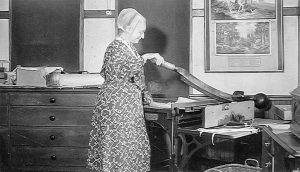
The film, which is a mix of archival photography, drone footage, and on-site interviews with Reklis and Schutz, is meant to whet the appetite of those who know nothing of the Shakers. The group was founded in 1770 by Mother Ann Lee, a native of England who moved to the United States in 1774 and eventually settled near Albany. The group she founded was defined by a radical embrace of celibacy; communal living; simple, elegant furniture; and ecstatic behavior during worship services that earned the group the “Shaker” name.
For Reklis, the Shakers offer an opportunity to reflect on what it means to be an American, what it means to be religious, and what it means to live in a community. These are questions that have resonated even more since the start of the pandemic, she said. Many of the experts she convened as part of her research project told her they were first drawn to Shaker furniture, whose influence can be seen today in every Ikea around the world. But as these scholars learned more about the Shakers, they quickly concluded that the furniture was simply a physical manifestation of a deeper, radical take on life.
“Our fixation became about questions of utopianism and community. Is it possible to think outside of capitalist models of production, communal arrangements, and taking care of each other?” she said.
“None of us are going to become Shakers, take vows of celibacy, or live in this communal life. But why are they so perennially fascinating, and what can we learn about the kind of radical visions they had about what it meant to be religious, American, and a witness to something really distinct?”
Viewed from today’s perspective, the Shakers were profoundly paradoxical, she said. Since all members took a vow of celibacy, no one was born into the group, which lasted 150 years (there are currently three members left). All new members were either converted or were taken in as orphans, as there were no state-run orphanages in the United States at the time. That necessitated an openness to outsiders, who brought with them new skills and expertise. It also resulted in communities where men and women were treated equally, and Black and white converts were welcome.
“They embraced every technology that came along. Many of the communities had 400, 500, or 600 people living together. To produce the food that you needed, you needed to embrace mass scale,” she noted.
“What I find most intriguing about the Shakers is where their unique theology and ecstatic religious experience met really practical, communal life concerns. That’s super fascinating to me, and I hope that other people will be intrigued and maybe think for a moment about different models.”
Gibson said he hoped that focusing on the design legacy of the Shakers would spur viewers to explore the Shakers in a more depth way.
“We wanted to highlight not what a cool Shaker box looks like, or a Shaker-style chair. People know that. We really wanted to focus on where that design came from. It’s not just a look or an aesthetic. It was born out of their religious beliefs and their communal style of living. It was very practical; it was very pragmatic,” he said.
“This was the largest Utopian movement in U.S. history, and it lasted 150 years. It’s another part of our country’s history, and even as we’re being torn apart now, there’s another path that we have followed in the past and that we can learn from today.”
